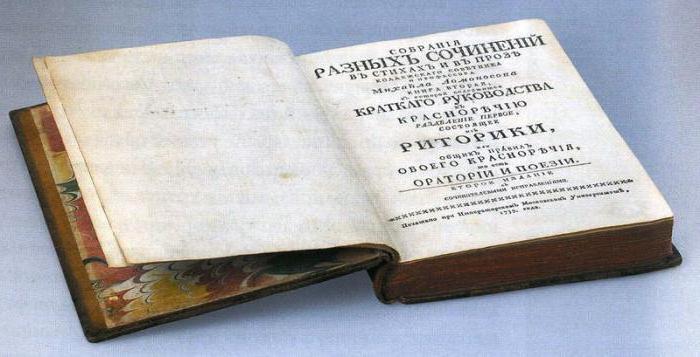Mikhail Vasilievich Lomonosov forever went down in history as a great reformer of the Russian language and versification. Russian literature in the 18th century was influenced by the significant changes that came into the cultural and social life of the country after Peter's reforms. MV Lomonosov was at the origins of the birth of new Russian literature. He is not only the great scientist of his time, but also the best poet of that era. So what is Lomonosov’s contribution to literature? He wrote works of completely different genres: fables, epigrams, lyric poems, satirical, odes, tragedies. But his merit is not only this.
Russian language reform
With the name of Lomonosov we associate the reform of the Russian language. He was the first to create scientific Russian grammar. His work on three styles, the essence of which is that church-book speech is outdated and is a kind of brake, was revolutionary at that time. Therefore, the contribution of Lomonosov to the development of literature is difficult to overestimate. He was the first to call for the development of an understandable and vibrant language. And to do this, borrow all the best from folk speech and introduce these elements into works of art. In the “Letter on the Rules of Russian Poetry” (1739), he says that language should be developed based on its natural properties and not borrowed from elements of other people's speech. But this remark is very relevant in our days, when the Russian language is full of English terms, Americanisms that supplant native speech.
M. V. Lomonosov: contribution to the Russian language and literature
Linguistics and literary criticism are multifaceted sciences. In the process of studying them, attention is paid to stylistics. And here Lomonosov’s contribution to literature is truly invaluable. He suggested using low, mediocre and high styles. What it is? High style was to be used for writing odes, poems, holiday speeches. Medium - for friendly letters. A low style was recommended to set out ordinary stories, compose comedies, epigrams, songs. In this vein, the use of vernaculars was also allowed. So Mikhail Vasilyevich harmoniously combined both the old and the new into one.
The phrase that Lomonosov made an enormous contribution to the development of the Russian language and literature is not just pathetic. He possessed deep knowledge in the field of exact sciences, was familiar with Western European languages, Latin and Greek. Natural talents allowed Lomonosov to lay the foundation of Russian scientific, technical terminology. His advice in this area is of great importance at the present time. We often do not even notice that many of the terms compiled according to his recommendations are still in use today. For example, the specific gravity, the axis of the earth ... It was Mikhail Vasilyevich who introduced into scientific terminology a series of words that have ordinary everyday meaning: motion, particles, experiments. Gradually, these innovations replaced the previous terminology. So the great famous Russian scientist laid the foundations of a scientific language, without which it would be difficult for modern learned men and ordinary people to do.

Achievements in the field of literary creativity
And now let's go back to the main topic of our conversation and remember (and someone may only find out) what was Lomonosov’s contribution to literature ... It should be said that he completed the reform of versification and backed it up with his own works of the poetic genre.
In addition, Lomonosov contributed to the formation of classicism in Russian literature. With his odes, he glorified the victories of the Russians over his enemies (Ode to the Capture of Khotin). But they included both scientific and religious topics (“Morning Reflections on God's Majesty”). Lomonosov was a citizen poet by nature. In his works, he clearly demonstrates his own attitude to poetry. Mikhail Vasilievich praises Empress Elizabeth Petrovna as a supporter of enlightenment, welcomes peace and tranquility as a guarantee of the development of sciences. He praises the reforms of Peter.
And how the poet describes the expanses of Mother Russia, the sea, the river and the forest! All these riches must be mastered and put at the service of the power and the people by learned people. Lomonosov deeply believed in the Russian people. In his opinion, the strength and good of the powers lie in the development of the exact sciences.
Multifaceted personality
Lomonosov's contribution to literature is the new size of the verse, and other speech, and content. In fact, a new era in literature began with this. It should be noted that for all the value of the works of Lomonosov in this area, they were only incidental to him. His main specialization was natural science. In this area, the genius of this person manifested itself with greater force. And he looked at his literary works as the best form of expression of revolutionary thoughts. Lomonosov also used such forms of poetry as epigrams, satirical works, poetic playful plays. With the boring literature of those times, his plays sometimes provoked a storm and harsh criticism.
Proceedings of the great scientist
Lomonosov introduced the theory of classicism into the nascent Russian literature, where it dominated the entire eighteenth century. The most important works of Mikhail Vasilievich in the field of the Russian literary language and versification were: “Russian grammar” (1755-1757), “Reasoning about the use of church books in the Russian language” (1757), “Letter on the rules of Russian poetry” (1739).

In order to assess the contribution of Lomonosov to literature and language, it is necessary to understand the position of the Russian language in that era. In ancient Russian writing, a sharp discrepancy was established between literary speech, living language and the language of the "book". This situation persisted for seven centuries. But with the reforms of Peter the Great, an indefinite mixture of new elements appears. And only Lomonosov, with his characteristic genius, was able to build harmonious ranks of a new literary language out of chaos. In the study of Russian grammar, Mikhailo Vasilievich first formulated strict scientific rules, pinpointing the difference between literary and church language.
To summarize
What did M.V. Lomonosov do for us? The contribution to the Russian language and literature of this pundit is truly enormous, however, as are the achievements in the field of exact sciences. He expanded the facets of the strictly regulated poetics of classicism, showed further ways of development of domestic versification. Romantic poets will use his tricks in the early nineteenth century. Mikhail Vasilievich became the founder of the ode, having developed a special poetic form necessary for the presentation of high patriotic ideas.
That was Lomonosov’s contribution to Russian literature.